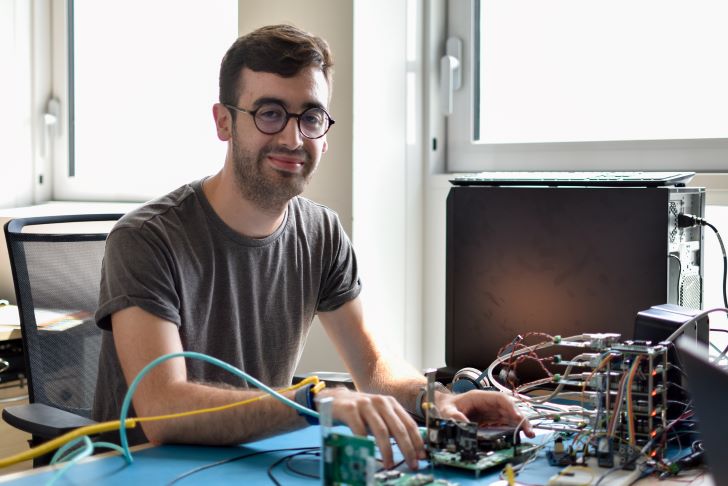Santiago TORRES-BORDA is a student engineer in digital sciences at ENSEEIHT. He is doing his internship on the EDEN project and tells us about his experience at the IRT Saint Exupéry.
Santiago TORRES-BORDA is a student engineer in digital sciences (speciality embedded systems) at ENSEEIHT. Santiago joined the IRT in March to carry out his internship within the axis Methods and Tools for the development of complex systems and more precisely within the framework of the EDEN project.
The EDEN project consists in the evaluation and the design of the bricks of an embedded communication architecture based on the TSN (Time-Sensitive Networking) standard for critical systems. It involves multi-sector industrial actors from aeronautics, space and automotive domain.
Santiago contributes to the EDEN project by designing an extension of the demonstrator based on the Ethernet 10BASE-T1S technology. Unlike traditional switched Ethernet, 10BASE-T1S is a fieldbus network. The challenge of the use of this technology is to reduce the hardware weight of embedded systems while aiming to unify Ethernet networks and ensure reliable network synchronization.
Santiago’s demonstrator reproduces an network embedded system with frame communication from classical Ethernet to 10BASE-T1S Ethernet bus. The goal is to demonstrate the capabilities and reliability of this technology in order to prove that 10BASE-T1S can replace conventional busfield technologies in critical systems.
Following his internship, Santiago will continue his studies by a PhD thesis at ISAE-SUPAERO on embedded systems.
EDEN Project
Budget : 3 000 000 €
Members : Airbus, Airbus D&S, Continental, CNES, SAFRAN ED, Thales Alenia Space, Thales Avionics, ISAE, ONERA
Informations : The objective of this project is to get full confidence and enable deployment of Ethernet Time Sensitive network (TSN) as embedded network for multi domains architectures (aeronautic, spatial and automotive)

Feedback from Philippe Cuenot, Project Manager at IRT Saint Exupéry, seconded by Continental Automotive
« I think it’s important to have interns on our teams, and it serves several purposes:
First, it’s to disseminate new knowledge to our interns by training them in new technologies with innovation perspectives, and potentially in the future to influence teaching programs through relationships with teachers.
Second, they offer new perspectives. These internships allow us to investigate new innovative solutions within the framework of projects, and to translate them into concrete case studies for the interns. They studies new solutions that can be integrated in our research.
We supervise and guide the trainees, in particular to ensure that the industrial context for these new technologies is covered, but they still get freedom in terms of execution. In the case of Santiago’s internship, the study framework was set in relation to the aircraft architecture context of a project study case. We guided him on the implementation and on the technological needs that interest us. Santiago showed great involvement, autonomy and creativity! He produced quality results and we are very satisfied with his internship! »


